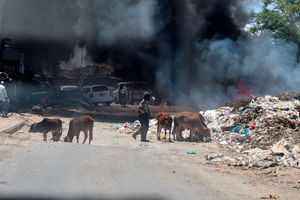My father got lung cancer without a puff of smoke

About eight out of 10 primary lung cancers are diagnosed as non-small cell lung cancer with adenocarcinoma, which is the most common lung cancer in non-smokers.
What you need to know:
- Every year, 9,000 deaths in Kenya are linked to causes related to tobacco use and thousands of people are left seriously ill and on the brink of death.
- About eight out of 10 primary lung cancers are diagnosed as non-small cell lung cancer with adenocarcinoma, which is the most common lung cancer in non-smokers.
For months, Jared Biwott and his family asked themselves the same question: How? It was posed in casual conversations and, whenever he retired to bed at night, it still haunted him.
In July 2021, as the grip of Covid-19 began to loosen in Kenya, his father, Eliud Kibiwot, began to cough.
“It was a persistent cough, and we thought he might have contracted the coronavirus or the common flu. When the cough got worse and he started experiencing pain when he yawned and even when he breathed, he sought medical attention," he offers.
At the hospital, the doctor prescribed a course of pills and said he was probably on his way to recovering from the virus. But he didn't get better. If anything, he began to deteriorate drastically.
“After two inconclusive hospital visits and his deteriorating health, medical professionals recommended an X-ray. The results showed an abnormal whitish substance in his left lung. Follow-up tests a month later showed it had not only increased in size, but had spread to the other lung, and we were asked to see a radiologist," he says. Back from the hospital, Biwott couldn't shake the weight of worry. He prayed fervently in his mind, hoping against hope that the diagnosis would be something other than cancer.
"I would say we can deal with TB or even pneumonia, but cancer? My father was 68 years old, and a deep fear of death gripped me," he says. The biopsy results showed that he had non-small cell lung cancer (NSCLC), in which cancer cells form in the tissue of the lungs. About eight out of 10 primary lung cancers are diagnosed as NSCLC with adenocarcinoma, which is the most common lung cancer in non-smokers.
"I remember the doctor asking if my dad was a smoker, and he said he had never smoked in his life. He was a staunch Christian, I neither drank nor smoked," he says.
Biwott and his family come from Uasin Gishu County, a region known for its tea plantations and cattle ranching.
"Before his diagnosis, I was not aware that lung cancer could be caused by factors other than tobacco use," he reflects.
Dr Solomon Mutua, a clinical oncologist at Nairobi West Hospital, explains that there are other risk factors for lung cancer, such as environmental and air pollution, occupational exposure and family history.
"Cancer is usually an abnormality of cell growth. So if you have something that eventually leads to abnormal cell growth, it can lead to cancer. The biggest risk factor for lung cancer worldwide is cigarette smoking, which causes over 90 percent of all lung cancers, but then there are all these other risk factors," he offers.
According to the World Health Organisation (WHO), tobacco kills more than eight million people each year, including an estimated 1.3 million non-smokers who are exposed to second-hand smoke. Tobacco use is also the leading risk factor for cancer, accounting for approximately 22 percent of cancer deaths.
Lung cancer is the leading cause of cancer-related deaths worldwide, with the Global Cancer Observatory, Globocan, estimating in 2020 that out of 1,435,943 lung cancer cases, 794 cases will be from Kenya.
Furthermore, an ongoing study commissioned in March 2022 by the Kenya Tobacco Board focusing on Kisumu, Nakuru, Mombasa and Nairobi counties shows that three out of 10 youths use tobacco and many of them are either university or college students. Every year, 9,000 deaths in Kenya are linked to causes related to tobacco use and thousands of people are left seriously ill and on the brink of death.
"We experienced stigma as a family, and we went through the experience without a strong support system. If my father had a different type of cancer, I think it would have lessened our burden and given us some closure," he offers.
By the time Biwott’s father was diagnosed, the cancer was stage four, meaning it had spread to other parts of the body. The cost of treatment, he says, was beyond the family's financial means, and they had to ask well-wishers to fundraise.
"He died less than five months after the diagnosis and two days before my wedding; it was a double tragedy. A year later, we had to sit down as a family and go through what had happened and educate each other about other risk factors for lung cancer. That gave us a sense of peace," says the 36-year-old teacher.
Florence Nyambura, 64, was diagnosed with breast cancer in 2013, which spread to her left lung due to delayed treatment.
"Whenever I told people that my left lung was affected by cancer, I could see the shock in their eyes. At the mention of the lung, many wondered if I had ever smoked in my life; I hadn't, I would tell them," she says.
From his experience, Biwott says he realised there was a lot of misinformation and ignorance surrounding cancer.
"Together with other residents, we formed the Uasin Gishu Non-Communicable Diseases Advocacy Chapter. We educated members of the community on what signs to look for in cancer, early detection, treatment and advocacy more so in lung cancer. But most importantly, I joined for the support system," he says.
"We need to educate the masses and counsel lung cancer patients. Even those who smoke may have psychological problems because they feel and are sometimes made to feel that they have brought it upon themselves," Dr Mutua says.





